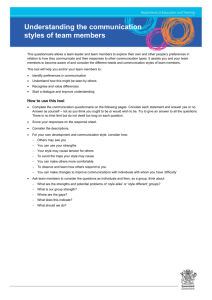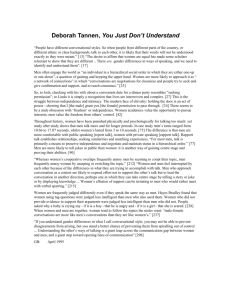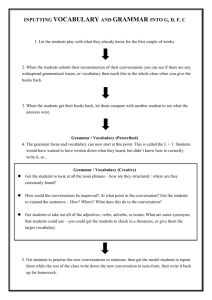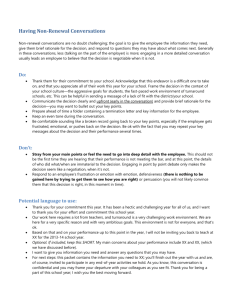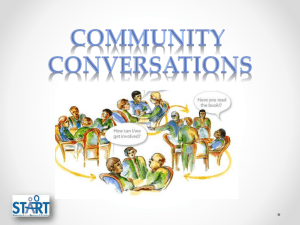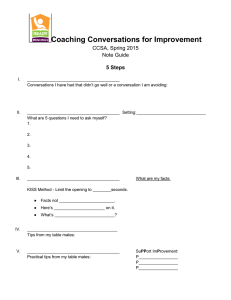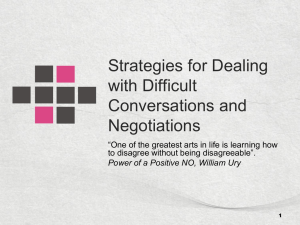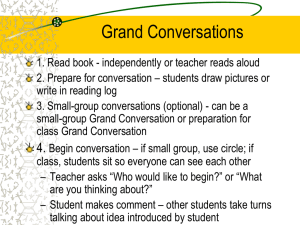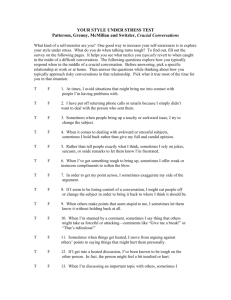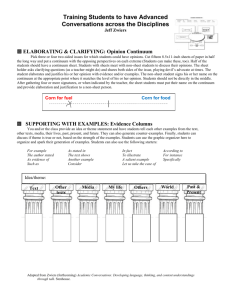Communication Styles Questionnaire for Team Members
advertisement
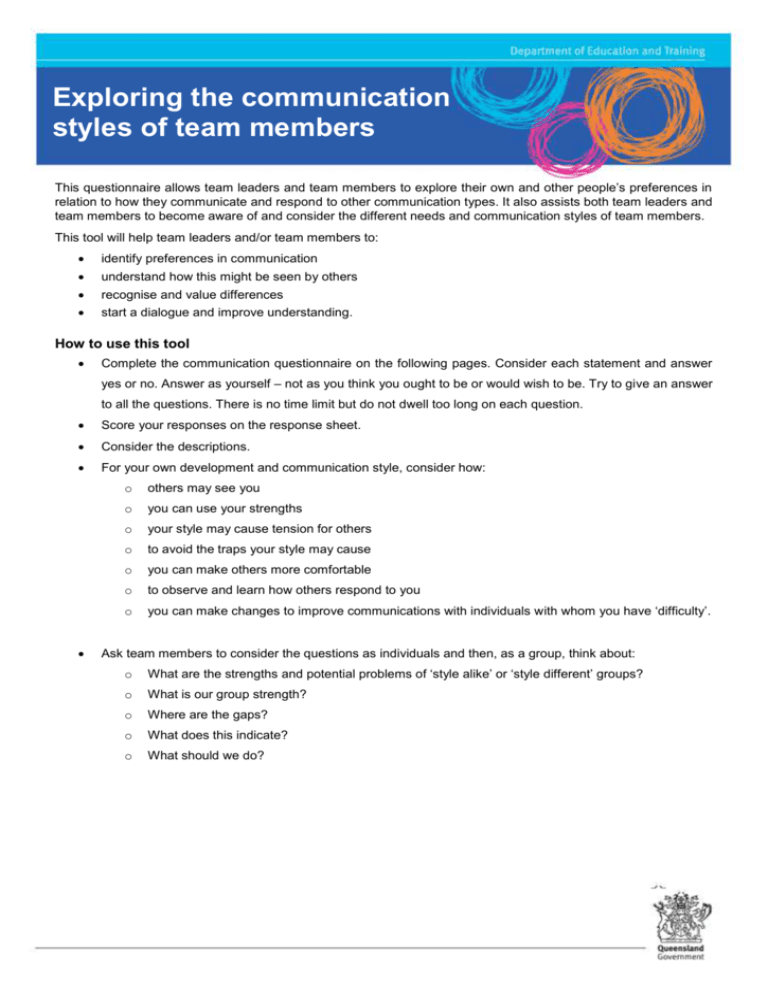
Exploring the communication styles of team members This questionnaire allows team leaders and team members to explore their own and other people’s preferences in relation to how they communicate and respond to other communication types. It also assists both team leaders and team members to become aware of and consider the different needs and communication styles of team members. This tool will help team leaders and/or team members to: identify preferences in communication understand how this might be seen by others recognise and value differences start a dialogue and improve understanding. How to use this tool Complete the communication questionnaire on the following pages. Consider each statement and answer yes or no. Answer as yourself – not as you think you ought to be or would wish to be. Try to give an answer to all the questions. There is no time limit but do not dwell too long on each question. Score your responses on the response sheet. Consider the descriptions. For your own development and communication style, consider how: o others may see you o you can use your strengths o your style may cause tension for others o to avoid the traps your style may cause o you can make others more comfortable o to observe and learn how others respond to you o you can make changes to improve communications with individuals with whom you have ‘difficulty’. Ask team members to consider the questions as individuals and then, as a group, think about: o What are the strengths and potential problems of ‘style alike’ or ‘style different’ groups? o What is our group strength? o Where are the gaps? o What does this indicate? o What should we do? Communication questionnaire QUESTIONS 1 Do you think it is a sign of strength not to show emotions during a crisis? 2 Do you often interrupt people when you think they are incorrect? 3 Does it annoy you when people try to cheer you up? 4 If you ask someone to do something and they do it wrong, do you have a go at them? 5 When others have little to say are you able to keep a conversation going? 6 Are you proud of your ability to deal with people? 7 Do tactful people annoy you because you wish people would say exactly what they mean? 8 When you are down in the dumps, do lively people make you feel even worse? 9 Do you try to sound confident even when you are unsure about the facts? 10 Are you impatient with people who like to discuss their motives? 11 Do you think that your feelings are too deep to discuss with others? 12 Do you keep quiet when you feel you may offend someone? 13 Are you diplomatic when you have to tell others to do something against their will? 14 Does it bother you when others correct your mistakes? 15 Do you find it difficult to discuss your problems with others? 16 Are you embarrassed by people who talk about their feelings? 17 Do you believe people when they ask you if you are all right? 18 Do you find it hard to admit to your mistakes? 19 Do you believe that people take advantage of those who are considerate? 20 Do you value good manners in others? 21 Do you feel immediately inclined to tell others when something exciting happens to you? 22 Do you hate to be taken for a ride? 23 Do you pride yourself on your ability to put up with setbacks? 24 If someone asked you not to disturb them would you feel hurt? 25 Are you often first to speak when an opinion is requested? 26 Do you enjoy being provocative? 27 Do you think that being blunt is harmful? 28 Do you get bored with conversations that don’t concern you? 29 Do you feel that people don’t understand you? 30 Do you like to be the centre of attention? 31 Do you treat conversations as a chance to test your mettle against others? 32 If a colleague has a different opinion from yours, will you try to win them over to your point of view? 33 Do you think that people should keep their problems to themselves? 34 Do you find it hard to keep a secret? 35 Do you ignore people when they make you angry? 36 If a colleague is unhappy would you actively discuss their problems? 37 If you have a problem would you silently worry about it, even during an evening out? 38 Does it annoy you to hear someone else dominating a conversation? 39 Do you worry about whether other people like you? 40 Do you resent being asked what you are thinking or feeling? 41 Do you think that your colleagues ought to know what makes you tick? 42 Do you visibly show your emotions? 43 Would you hate to show your distress in front of a colleague? 44 When you have some time alone, do you spend much of it on the telephone? 45 Do you find advice from others irritating? 46 Will you say almost anything to fill a lull in a conversation? 47 Do you see it as your responsibility to keep other people happy? 48 Do you often find other people oversensitive? YES/NO Scoring Transfer your 'Yes' and 'No' answers for each of the 48 statements to the relevant boxes. Add up the number of 'Yes' answers for each column and write the total in the blank box at the bottom of each column. Each score will represent how you conform to the particular style of communication. If you score six or more 'Yes' answers for a category then this suggests that you have a natural tendency to use this style. Response sheet 4 2 3 5 7 9 8 21 17 14 11 24 19 18 15 28 22 25 29 30 26 32 35 34 31 38 37 44 48 45 42 46 Total number of times you answered Yes in a column: A: B: C: D: Style A B C D E F Positives Doesn’t get pushed around Clear Focused Results orientated Has a view on everything Usually ‘expert’ in one area Can step in and take charge Always joins in Always makes allowances Highly emotional Risk analyser Easy to get on with Lots of friends Sociable Non-threatening Sense of humour Seen as emotionally stable Tower of strength Used as sounding board Confidential Influences from behind Quiet and thoughtful Gets on with most people 1 10 16 23 33 36 40 43 6 12 13 20 27 39 41 47 E: F: Negatives Uses conversations as a duel to be won Can be argumentative (and likes it) Tries to gain dominance Can ‘put down’ less able people Takes over conversations Not always inclusive of quieter members Can be negative Appears withdrawn when thinking Needs time to make decision Emotionally draining Talks too much about nothing Lots of friends Uncomfortable with short silences Talks over quieter members of the group Can be seen as aloof Takes too much on Risk of burnout Can be too self-critical Avoids conflict Doesn’t say what they truly mean Can be seen as manipulative by more direct communicators
